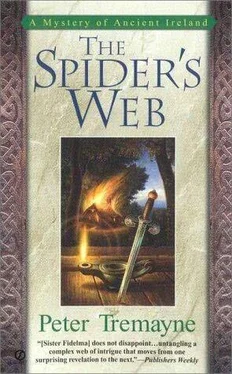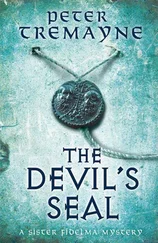Peter Tremayne - The Spider's Web
Здесь есть возможность читать онлайн «Peter Tremayne - The Spider's Web» весь текст электронной книги совершенно бесплатно (целиком полную версию без сокращений). В некоторых случаях можно слушать аудио, скачать через торрент в формате fb2 и присутствует краткое содержание. Жанр: Исторический детектив, на английском языке. Описание произведения, (предисловие) а так же отзывы посетителей доступны на портале библиотеки ЛибКат.
- Название:The Spider's Web
- Автор:
- Жанр:
- Год:неизвестен
- ISBN:нет данных
- Рейтинг книги:5 / 5. Голосов: 1
-
Избранное:Добавить в избранное
- Отзывы:
-
Ваша оценка:
- 100
- 1
- 2
- 3
- 4
- 5
The Spider's Web: краткое содержание, описание и аннотация
Предлагаем к чтению аннотацию, описание, краткое содержание или предисловие (зависит от того, что написал сам автор книги «The Spider's Web»). Если вы не нашли необходимую информацию о книге — напишите в комментариях, мы постараемся отыскать её.
The Spider's Web — читать онлайн бесплатно полную книгу (весь текст) целиком
Ниже представлен текст книги, разбитый по страницам. Система сохранения места последней прочитанной страницы, позволяет с удобством читать онлайн бесплатно книгу «The Spider's Web», без необходимости каждый раз заново искать на чём Вы остановились. Поставьте закладку, и сможете в любой момент перейти на страницу, на которой закончили чтение.
Интервал:
Закладка:
Dubán examined them with intrigue. He clearly had no knowledge of the ancient form of writing.
‘Was Teafa a scholar then?’ asked Eadulf.
The warrior shook his head in bewilderment.
‘I don’t think she pretended to be but I believe that she was well versed in the arts and poetry. If so, she probably knew the old alphabet so it does not surprise me that she had these books here.’
‘Even so,’ Fidelma reflected, ‘I have not seen such a fine collection outside an abbey library.’
Eadulf carefully retied the bundle and replaced it with the others while Fidelma turned back into the main room. She crossed to the second sleeping chamber. Teafa’s room contained more ornaments and elaborate furnishing. There was an air of past opulence which a daughter of a chieftain and sister of a chieftain would doubtless assume. The candle now being unnecessary, Fidelma extinguished it with a swift breath. She turned to Dubán.
‘So once you had reported the death of Eber to Crón and she had asked you to fetch Teafa to pacify him, you came directly here?’
‘I did. I arrived at the door and found it was partially open.’
‘Open?’
‘It stood ajar just a fraction — enough for me to sense something was wrong.’
‘Why? Surely a door standing ajar is not a sign of anything being amiss?’
‘Teafa was fastidious about closing doors.’
‘To keep Móen in?’ Eadulf hazarded.
‘Not exactly. Móen was allowed to move about but, in order for him to be aware of the boundaries of where he was, doorswere always kept shut so that he did not pass through inadvertently.’
‘I see. Go on. The door was ajar.’
‘The place was in darkness. I called out to Teafa but there was no reply. So I pushed open the door and stood for a moment on the threshold. By then the dawn was coming up — it was that period of half light. From that I saw a bundle of clothes, or so I thought, on the floor. As I looked more closely I realised that it was a body. Teafa’s body.’
‘Show me where.’
Dubán pointed to a place before the hearth whose ashes now lay grey and chill. Fidelma had noticed the pungent smell of burnt wood immediately she had entered the cabin.
‘I looked around, found a candle and was able to light it. In fact, the very same candle we used just now. The body was that of Teafa. There was blood all over her clothes. She had been stabbed savagely in the chest, around the heart, several times.’
Fidelma bent down to the floor and could see dark stains that had been caused by blood. At the same time she observed a small burnt area on the floor close by and she realised that it was this that smelled more acerbically than the remains in the fireplace. Nearby this was a stain. It was not a blood stain. She placed a finger on the still damp area and sniffed. It was oil.
‘Was anything lying here?’ she asked.
‘A broken oil lamp,’ Dubán recalled after a pause for thought. ‘It has been tidied away, I think.’
‘Did you get the impression that Teafa had been holding it when she was struck down?’
‘I did not think much about it. But now that you mention it, it does seem likely that she was holding the lamp in her hand and dropped it when she was struck down. It must have fallen to the floor causing a small fire to start which, God be praised, did not spread and soon extinguished itself.’
Fidelma gazed thoughtfully at the burnt patch.
‘It would have been fierce enough to have burnt this entire cabin had it not been extinguished. And there is still unburnt oil here.’ She held out her finger with the tell-tale oil stain on the tip. ‘What could have caused it to be quenched?’
‘Well, it was out when I arrived here,’ Dubán shrugged.
Fidelma was about to rise when she saw a piece of unburnt stick in the fireplace. There was nothing extraordinary about it apart from a few notchings. It was about three inches long and was a piece of hazel. She picked it out of the ashes and examined it carefully.
‘What is it?’ demanded Eadulf.
‘An Ogam wand which has nearly burnt away completely.’
Something had prevented this piece of the hazel from burning, perhaps the way it had fallen from the fire. A few letters remained which made no sense at all. Between the burnt ends she could make out ‘ … er wants …’ But that was all. Why would Teafa wish to destroy this particular wand? Thoughtfully, Fidelma placed the piece of hazel in her marsupium and stood up.
Fidelma gave a final glance around the cabin. As with Eber’s rooms, it was tidy. There was nothing left in any real disorder. It was obvious that robbery was not a motive here.
‘Dubán, you indicated that Eber’s wife was not well disposed to Teafa. Did Teafa have a close relationship with her brother?’
‘To Eber?’ Dubán was evasive. ‘She was his sister and we all live in this small community.’
‘There was no animosity, no friction, as you claim with Eber’s wife, Cranat?’
Dubán spread his hands as if he had decided to give in to a greater force.
‘There was … I cannot explain it very well … a distance between brother and sister. I have a sister of whom I am fond. And even though she is married and with children, I eat often with her family and take her children hunting. Teafa never had a warm relationship with Eber. It might well be that there was someanimosity over her adoption of Móen but I could not speak authoritatively.’
‘I think that it is time that I spoke with this lady, Cranat,’ Fidelma murmured.
‘How about the relationship between Teafa and Eber’s daughter Crón?’ interrupted Eadulf.
‘They were polite and there were no harsh words between them. That is about all.’
‘Incidentally, how was Móen generally treated in this community?’ pressed Fidelma.
‘Most people treated him with tolerance; with pity. They had known him since the time Teafa brought him to the community. The lady Teafa was very respected by the people. Eber had time for the boy. But not so Cranat, who refused to have the boy near her. Also Father Gormán forbade the boy to enter his chapel. Crón seemed indifferent to him.’
‘In a Saxon community, he would have been killed at birth.’ Eadulf was unable to stop the comment which sprang to his lips.
Fidelma drew her brows together.
‘A fine Christian attitude to take, no doubt?’
Eadulf flushed and Fidelma felt a pang of regret for the sharpness of her tongue for she had no doubt that Eadulf would have no part in such attitudes.
‘People who have physical disabilities may be ineligible for office, may not be king or chieftain, but they are members of the community,’ Fidelma explained patiently to Eadulf. ‘All other rights are theirs to enjoy, only the person’s legal capacity or responsibility is changed depending on their disability. For example, an epileptic is legally competent if they are of sound mind. But a person who is deaf and dumb cannot be subjected to distraint — the plaintiff must take action against their guardian in law.’
‘So Móen was not subjected to any inferior position?’ Eadulf observed wonderingly.
‘Not at all,’ replied Fidelma. ‘I have already told you that if hewere, then Teafa could have taken action under the law, for a heavy fine is levied on anyone who mocks or denigrates the disability of a person be he epileptic, a leper, lame or blind or one who is deaf and dumb.’
‘It appears that I have now learnt some law of the five kingdoms,’ Eadulf said penitently.
‘These are not the laws that our Father Gormán would have us follow,’ observed Dubán impassively.
Fidelma turned to him with interest.
‘Perhaps you would explain that?’
‘Father Gormán preaches the rules of Rome in his church. What he calls the Penitentials.’
Читать дальшеИнтервал:
Закладка:
Похожие книги на «The Spider's Web»
Представляем Вашему вниманию похожие книги на «The Spider's Web» списком для выбора. Мы отобрали схожую по названию и смыслу литературу в надежде предоставить читателям больше вариантов отыскать новые, интересные, ещё непрочитанные произведения.
Обсуждение, отзывы о книге «The Spider's Web» и просто собственные мнения читателей. Оставьте ваши комментарии, напишите, что Вы думаете о произведении, его смысле или главных героях. Укажите что конкретно понравилось, а что нет, и почему Вы так считаете.











